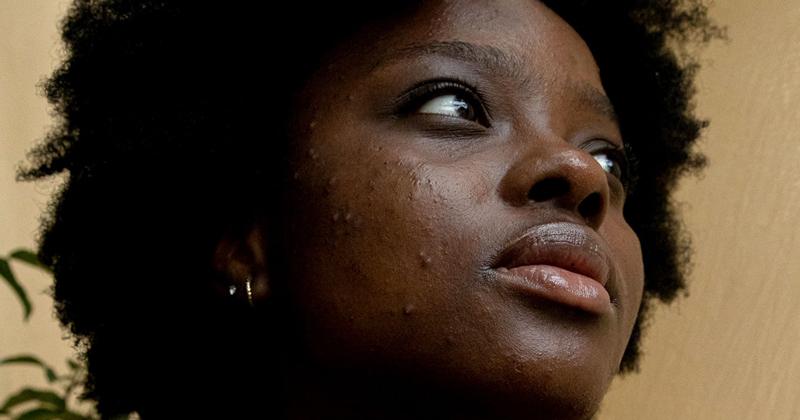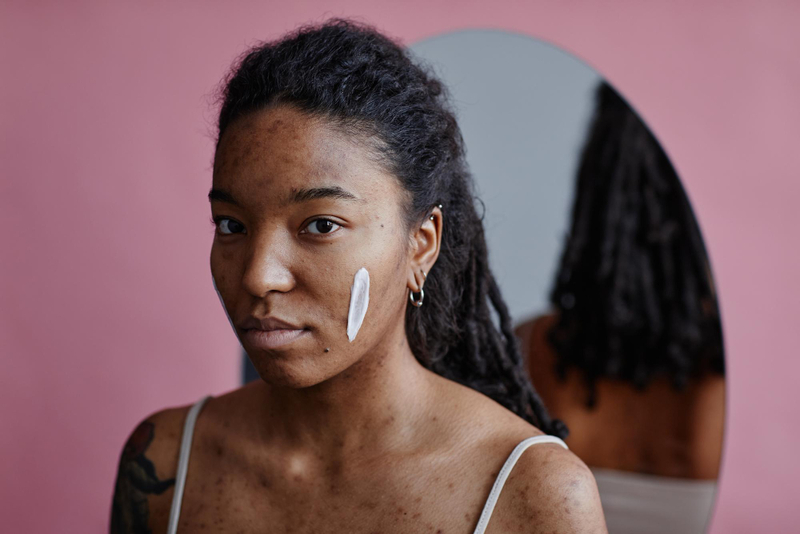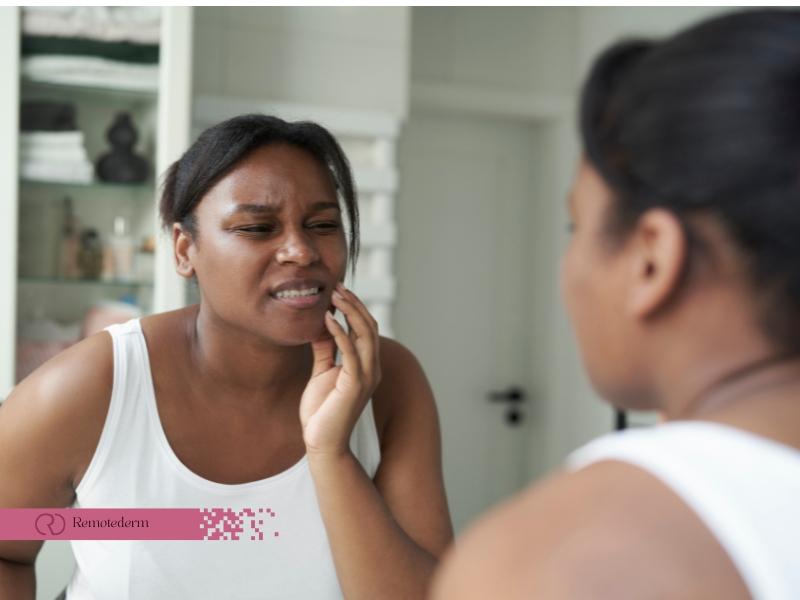Rosacea on black skin is a chronic skin condition that affects individuals in Canada, with unique symptoms and manifestations. While it’s often studied in Caucasian populations, it can appear differently on black skin, making it important to recognize the signs and seek the right treatments. This comprehensive guide explores the causes, symptoms, and available treatments for rosacea on black skin, offering practical tips to help manage the condition and achieve healthier skin.
Symptoms of Rosacea on Black Skin
Rosacea may appear differently on black skin than on lighter skin tones, so it’s essential to recognize how the condition might show up. When asking, what does rosacea look like on black skin? you should be aware of some typical symptoms, such as:
- Flushing and Redness: Flushing, a key symptom of rosacea, may be less noticeable on black skin due to the natural pigmentation. Instead of a red flush, the skin may appear slightly darker or discolored in affected areas.
- Swelling and Edema: Mild to moderate swelling can occur on the skin, causing it to appear puffy or raised, particularly around the nose and cheeks.
- Papules and Pustules: Rosacea can cause small, red, pus-filled bumps, which may look similar to acne but differ in cause.
- Skin Thickening: In severe cases, the skin may thicken, especially around the nose, causing a bumpy, uneven texture that may affect facial contours.
- Eye Irritation: Rosacea may also affect the eyes, leading to symptoms such as dryness, irritation, and a gritty sensation.

Identifying these symptoms can help you seek proper medical advice and treatment. Consulting with a dermatologist is crucial, as other skin conditions can mimic rosacea symptoms.
Causes and Triggers of Rosacea
The precise cause of rosacea is not yet fully understood, but several factors may contribute to its development, including:
- Genetics and Family History: Genetics can play a role, as a family history of rosacea increases the likelihood of developing the condition. Individuals with a close relative who has rosacea may be at a higher risk.
- Immune System Response: Abnormal immune system responses may cause inflammation, a key driver of rosacea symptoms. This inflammation can lead to the visible redness and other skin issues seen in rosacea.
- Environmental Factors: Exposure to triggers such as UV radiation, wind, humidity, and temperature fluctuations can exacerbate rosacea symptoms. These environmental conditions may lead to increased irritation and sensitivity.
- Lifestyle Choices: Factors such as stress, alcohol consumption, spicy foods, and hot beverages may trigger flare-ups. Avoiding these triggers or moderating their consumption can help manage rosacea.
Identifying personal triggers and learning how to manage them is key to controlling black people rosacea.
Treatment Options for Rosacea on Black Skin
Treatment for a black person with rosacea in Canada requires a tailored approach that considers the unique characteristics of black skin. Common treatment options include:
- Topical Medications: Prescription topical treatments such as metronidazole, azelaic acid, or ivermectin creams and gels can help reduce inflammation and redness.
- Oral Medications: Oral antibiotics like doxycycline can be effective for reducing severe symptoms and are often prescribed for short-term use.
- Laser Therapy: Laser treatments, such as vascular lasers, can target blood vessels, reducing redness, flushing, and swelling.
- Lifestyle Modifications: Making adjustments to avoid triggers, such as excessive sun exposure, stress, and certain foods, can help prevent flare-ups and maintain healthy skin.

Online rosacea treatment services in Canada may also offer convenient consultation and prescription options, especially for those unable to visit a healthcare provider in person.
Managing Rosacea on Black Skin
Effective management of rosacea on black skin involves a combination of proper skin care, medical treatment, and lifestyle adjustments. Consider these strategies:
- Sun Protection: Daily application of a broad-spectrum sunscreen with SPF 30 or higher is essential for UV protection and reducing the risk of flare-ups. To ensure the best protection, select a sunscreen that is appropriate for your skin type and tone.
- Gentle Cleansing: Cleanse your face gently using a non-abrasive, fragrance-free cleanser to avoid further irritation and maintain a healthy skin barrier. Avoid using hot water during cleansing, as it can exacerbate symptoms.
- Moisturizing: Keep the skin hydrated with a non-comedogenic moisturizer to prevent dryness and support the skin barrier. Opt for products specifically designed for sensitive skin to reduce the risk of irritation.
- Avoiding Irritants: Stay away from harsh skincare products, especially those containing alcohol, fragrances, or other potential irritants. Even natural ingredients can be irritating, so patch-test new products before using them on your face.
- Dietary Adjustments: Identify and limit dietary triggers such as spicy foods, hot drinks, and alcohol to help manage rosacea symptoms. Keeping a food diary can help you pinpoint which foods worsen your symptoms.
Establishing a consistent skincare routine and making healthy lifestyle choices can go a long way in managing rosacea on black skin.
Final Thoughts
Living with rosacea on black skin in Canada presents unique challenges, but with proper care and treatment, individuals can successfully manage symptoms and maintain healthy skin. Recognizing the signs, understanding personal triggers, and collaborating with a healthcare provider can help create a treatment plan tailored to you. If you suspect you have rosacea, don’t hesitate to seek professional help; an accurate diagnosis is the first step toward effective treatment.
FAQs
1. Can rosacea on black skin lead to other complications?
While rosacea primarily affects the skin, there may be potential links to other systemic health issues such as cardiovascular disease or gastrointestinal disorders.
2. Can rosacea on black skin affect other parts of the body?
Rosacea primarily affects the face, but some individuals may experience rosacea-like symptoms on other areas of the body, such as the neck, chest, and back.
3. How can I find support for managing rosacea on black skin?
Consider joining online or local support groups where you can share experiences and tips with others who understand the challenges of living with rosacea on black skin.
4. Are there specific makeup products for covering up rosacea on black skin?
Yes, there are makeup products designed for individuals with sensitive skin, including those with rosacea. Look for hypoallergenic, non-comedogenic options for optimal coverage and skin health.
